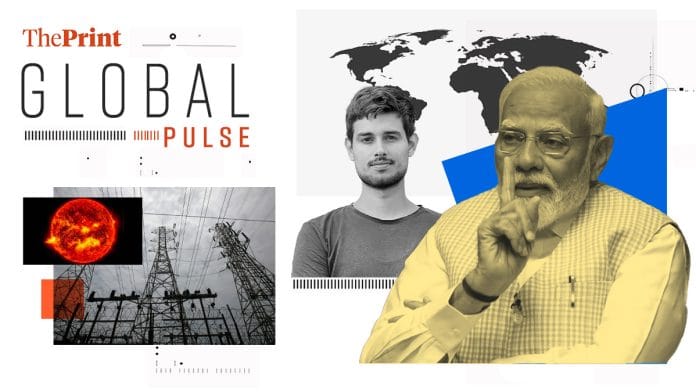New Delhi: Prime Minister Narendra Modi who entered the general election “projecting supreme confidence,” is appearing on the “defensive, and sometimes rattled”, as the polls enter the last leg, says a news analysis in The New York Times titled ‘Is Modi Worried? India’s Long-Deflated Opposition Finds Some Momentum’.
“India is witnessing something unusual from its powerful leader. It is seeing him sweat,” it reads, adding that the Opposition, which was “counted out after big losses to Mr Modi in the previous two national elections, has some fight left in it”. The analysis by Mujib Mashal and Pragati K.B. follows the opposition coalition in Maharashtra amidst the ongoing Lok Sabha elections. It quotes Congress president Mallikarjun Kharge referring to BJP as “frustrated” and talks about Delhi CM Arvind Kejriwal’s “vote for his jail or freedom”.
“The alliance (INDIA bloc) lost precious time in the months before the vote, bogged down by internal differences. But it has largely held together despite Mr Modi’s efforts to lure away some of its members and sideline others with legal actions,” the analysis goes on to add.
India is facing a “blistering summer” this year, and demand is causing power outages. The “current heatwave pushed electricity demand beyond a peak level forecast for this month,” with daily blackouts being reported in 38 percent of households as opposed to 20 percent in February this year.
Some households even reported power outages lasting nearly 12 hours.
Titled ‘Long Blackouts Hit India as Heatwave Stokes Power Use,’ a report in Bloomberg by Rajesh Kumar Singh says electricity demand has shot up in the northwest of the country, with the same even spurring protests in some regions, like the Delhi-NCR.
An opinion piece in The Wall Street Journal by writer and journalist Sadanand Dhume argues that “no Indian politician is willing to point out hard economic truths” and that both the BJP and the Congress in a quest to buy votes in exchange of freebies, are driving away wealth creators.
While the Congress, which has taken a left turn, promises everything from a caste census to free food grain, the BJP “guarantees” to continue the welfare schemes while proudly imposing higher taxes on the “super rich”.
Titled ‘India Could Become Venezuela on the Ganges’, the opinion piece argues that the BJP is the side that will get people “a good deal more than the other”, stating that “prime minister at least sees a role for business in modernising India,” and referring to a recent interview where he said “India should respect wealth creators instead of castigating them”.
It adds that Modi’s mix of welfare and freebies, is what “most investors will take any day over the wild notions of a Congress Party unmoored from common sense”.
Chris Kay reports for Financial Times on the sustained inflation and rising food prices in India. Residents are “still hurting from price hikes they have seen since the pandemic,” he writes.
Titled ‘Global brand fast-food chains suffer India profits slump,’ he goes on to add that there was a “46 percent year-on-year fall in profit from its operations in the country in the quarter through March”.
He further argues that “consumers have shifted from international fast-food brands to cheaper local alternatives” and that a similar trend is being seen in the US, where low earners are unable to “absorb food prices”.
The Economist in a report titled ‘India’s YouTubers take on Narendra Modi’ highlights the discourse of dissent against the Narendra Modi-led ruling BJP on YouTube. Citing examples of Dhruv Rathee, senior journalist Ravish Kumar, among other political commentators, the report points out how these individuals turned to YouTube at a time when consolidated ownership of media has “shrunk” the “space for critical reporting”.
The “billionaire friend of Mr Modi” — Mukesh Ambani — “controls more than 60 media outlets in India” and Gautam Adani, “known for his close ties” with Modi acquired NDTV, the outlet Ravish Kumar quit subsequently, it adds.
In a report for CNN, Aishwarya S. Iyer recently wrote that the foreign press has taken cognisance of the issues of media ownership alongside other challenges journalists in India face — arrests, allegations of spreading communal tensions, and death threats.
China’s Taiwan offensive, landslide in Papua New Guinea
On the second day of Chinese drills against Taiwan, the country mobilised its coast guard, navy, airforce and army. According to The Guardian, five approximate target areas in the sea surrounding Taiwan’s main island have been identified. Read this report to know more.
A massive landslide has hit six villages in Papua New Guinea. According to the BBC, while no casualties have been reported yet, nor any missing persons rescued, the catastrophe has buried more than 100 houses. To know more, read this report.
(Edited by Amrtansh Arora)
Also Read: Has Modi wave peaked? And jury still out on BJP’s Pasmanda outreach — global media reports







Modi and rattled…. Lol , He is someone who will rattle the opposition which is already visible from them with all the historical freebies…, what else can one expect from ” The Print ” speculative news !!
Modi’s critics are in hundreds and for years. Why should he be rattled? In fact in Modi’s case the more you criticise him, the more his popularity grows. Junta jaanti hai truth, some misplaced youtubers are just either mentally blind or flush with money!!